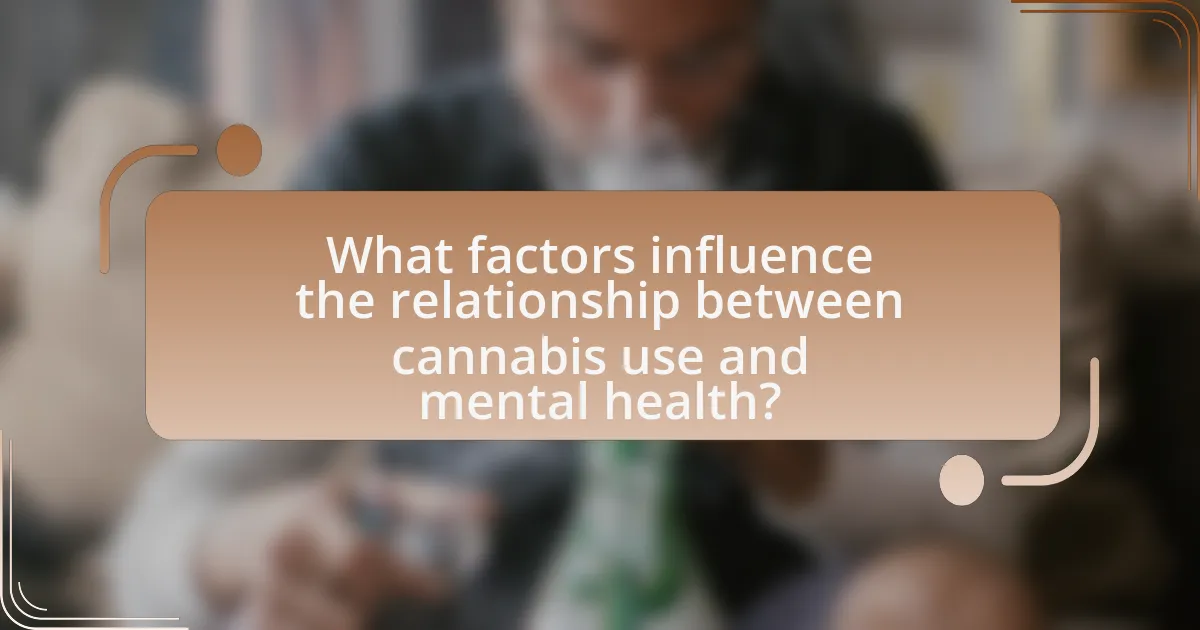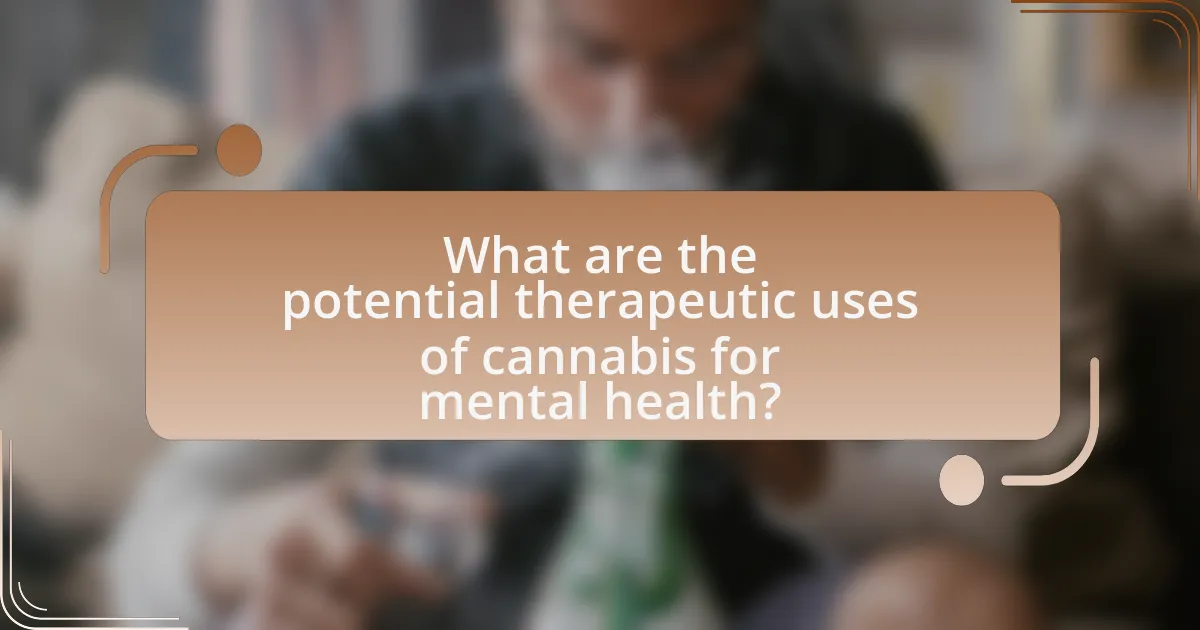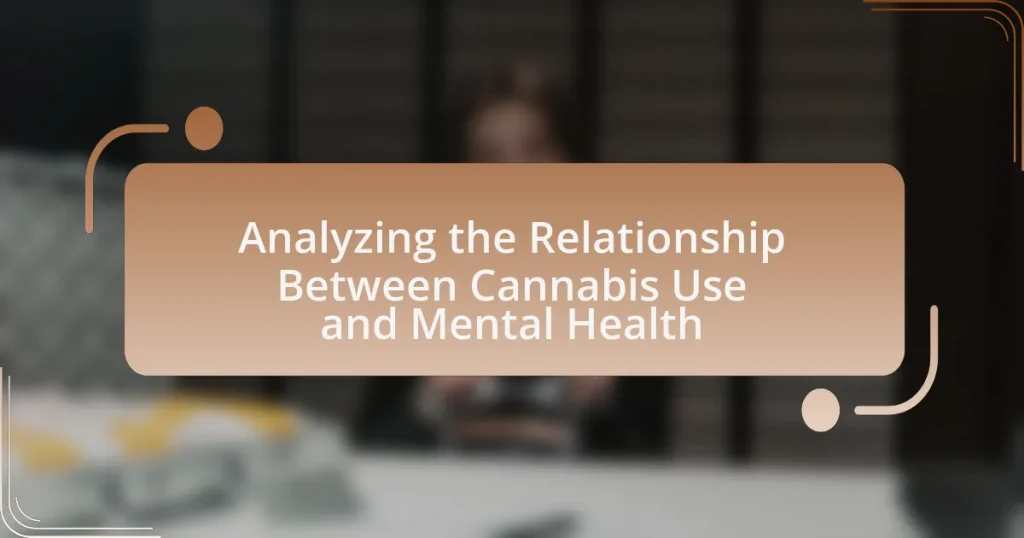The article analyzes the complex relationship between cannabis use and mental health, highlighting both positive and negative effects influenced by factors such as frequency of use, age of onset, and individual predispositions. Research indicates that while some individuals may use cannabis to alleviate symptoms of anxiety and depression, others face increased risks of mental health issues, including psychosis, particularly among those with genetic vulnerabilities. The article discusses short-term and long-term effects of cannabis on mental health, the importance of studying this relationship, societal implications, and the role of stigma. Additionally, it examines individual differences, environmental factors, and the potential therapeutic uses of cannabis, while also addressing the risks and best practices for its use in mental health treatment.

What is the relationship between cannabis use and mental health?
Cannabis use is associated with both positive and negative effects on mental health, depending on various factors such as frequency of use, age of onset, and individual predispositions. Research indicates that while some individuals may use cannabis to alleviate symptoms of anxiety or depression, others may experience exacerbated mental health issues, including increased risk of psychosis, particularly in those with a genetic vulnerability. A study published in the journal “Psychological Medicine” found that regular cannabis use is linked to a higher incidence of psychotic disorders, with a 41% increased risk for those who began using cannabis in adolescence. This duality highlights the complex relationship between cannabis and mental health, necessitating further investigation into individual differences and contextual factors.
How does cannabis affect mental health outcomes?
Cannabis can negatively affect mental health outcomes, particularly in individuals predisposed to mental health disorders. Research indicates that regular cannabis use is associated with an increased risk of anxiety, depression, and psychosis. A study published in the journal “Psychological Medicine” found that individuals who use cannabis frequently are more likely to experience symptoms of psychosis compared to non-users, with a dose-response relationship observed. Additionally, a meta-analysis in “JAMA Psychiatry” highlighted that cannabis use is linked to a higher incidence of anxiety disorders, particularly among adolescents. These findings underscore the potential mental health risks associated with cannabis consumption, especially in vulnerable populations.
What are the short-term effects of cannabis on mental health?
The short-term effects of cannabis on mental health include increased anxiety, altered perception, and impaired memory. Research indicates that while some users may experience relaxation, others report heightened anxiety and paranoia shortly after consumption. A study published in the journal “Psychological Medicine” found that acute cannabis use can lead to transient psychotic symptoms in vulnerable individuals, highlighting the potential for adverse mental health effects. Additionally, cannabis can impair short-term memory and cognitive function, as evidenced by findings from the National Institute on Drug Abuse, which show that THC, the active compound in cannabis, affects areas of the brain responsible for memory formation.
What are the long-term effects of cannabis on mental health?
Long-term cannabis use can lead to various negative effects on mental health, including an increased risk of anxiety, depression, and psychosis. Research indicates that individuals who use cannabis frequently are more likely to develop these mental health issues compared to non-users. A study published in the journal “Psychological Medicine” found that daily cannabis users had a significantly higher risk of developing psychotic disorders, with a 3-fold increase in risk for those who started using cannabis in their teens. Additionally, a meta-analysis in “JAMA Psychiatry” reported that cannabis use is associated with a higher incidence of anxiety disorders and depressive symptoms, particularly in individuals with a predisposition to mental health conditions. These findings underscore the potential long-term mental health risks associated with cannabis consumption.
Why is it important to study cannabis and mental health?
Studying cannabis and mental health is important because it helps to understand the complex interactions between cannabis use and various mental health conditions. Research indicates that cannabis can have both therapeutic effects and potential risks, such as exacerbating anxiety or triggering psychosis in vulnerable individuals. For instance, a study published in the journal “Psychological Medicine” found that heavy cannabis use is associated with an increased risk of developing psychotic disorders, highlighting the need for further investigation into its effects. Understanding these dynamics can inform public health policies, guide clinical practices, and improve treatment options for individuals with mental health issues.
What are the societal implications of cannabis use on mental health?
Cannabis use has significant societal implications for mental health, particularly in relation to increased rates of anxiety, depression, and psychosis. Research indicates that frequent cannabis consumption can exacerbate existing mental health conditions and may contribute to the onset of new disorders, especially among vulnerable populations. For instance, a study published in the journal “Psychological Medicine” found that individuals who use cannabis regularly are more likely to experience psychotic symptoms compared to non-users, with a reported increase in risk by up to 41%. Additionally, societal attitudes towards cannabis can influence mental health stigma, affecting individuals’ willingness to seek help. As cannabis becomes more socially accepted, the normalization of its use may lead to a decrease in perceived risks, potentially resulting in higher consumption rates and associated mental health issues within communities.
How does stigma influence perceptions of cannabis and mental health?
Stigma significantly influences perceptions of cannabis and mental health by perpetuating negative stereotypes and misconceptions about both cannabis use and mental health conditions. This stigma can lead to a reluctance among individuals to seek help for mental health issues or to disclose their cannabis use, fearing judgment or discrimination. Research indicates that stigma surrounding cannabis can result in a lack of understanding regarding its potential therapeutic benefits for mental health conditions, such as anxiety and depression. For instance, a study published in the journal “Psychological Medicine” found that stigma can deter individuals from using cannabis as a treatment option, despite evidence suggesting its efficacy in alleviating certain mental health symptoms. Thus, stigma not only shapes societal attitudes but also impacts individual choices and access to care related to cannabis and mental health.

What factors influence the relationship between cannabis use and mental health?
The relationship between cannabis use and mental health is influenced by several factors, including the frequency of use, the age of first use, genetic predisposition, and the presence of pre-existing mental health conditions. Research indicates that frequent cannabis use, particularly during adolescence, is associated with an increased risk of developing mental health disorders such as anxiety and depression. A study published in the journal “Psychological Medicine” found that individuals who began using cannabis before the age of 18 were more likely to experience psychotic symptoms later in life. Additionally, genetic factors can play a role; individuals with a family history of mental illness may be more susceptible to the adverse effects of cannabis. Furthermore, those with existing mental health issues may use cannabis as a form of self-medication, which can complicate their mental health outcomes.
How do individual differences affect cannabis use and mental health?
Individual differences significantly influence cannabis use and mental health outcomes. Factors such as genetics, personality traits, and pre-existing mental health conditions can determine an individual’s likelihood of using cannabis and their response to it. For instance, research indicates that individuals with a family history of mental health disorders may be more susceptible to using cannabis as a coping mechanism, which can exacerbate conditions like anxiety and depression. Additionally, personality traits such as high levels of impulsivity and sensation-seeking have been linked to increased cannabis use, which can further impact mental health negatively. Studies have shown that individuals with these traits are more likely to experience adverse psychological effects from cannabis, including increased anxiety and paranoia.
What role do genetics play in cannabis use and mental health?
Genetics significantly influence both cannabis use and mental health outcomes. Genetic variations can affect an individual’s susceptibility to mental health disorders, such as anxiety and depression, which may be exacerbated by cannabis use. For instance, research indicates that polymorphisms in the COMT gene are associated with altered dopamine metabolism, impacting both cannabis dependence and the risk of developing psychosis. A study published in the journal “Nature Neuroscience” by Caspi et al. (2005) found that individuals with a specific variant of the COMT gene who used cannabis were at a higher risk for psychotic symptoms compared to those without the variant. This evidence highlights the complex interplay between genetic predispositions and the effects of cannabis on mental health.
How do pre-existing mental health conditions impact cannabis use?
Pre-existing mental health conditions significantly influence cannabis use patterns. Individuals with conditions such as anxiety, depression, or PTSD often report using cannabis to self-medicate, seeking relief from their symptoms. Research indicates that approximately 30% of individuals with anxiety disorders use cannabis to alleviate their anxiety, while studies show that those with PTSD may use cannabis to manage intrusive thoughts and hyperarousal symptoms. However, this self-medication can lead to increased dependency and exacerbate mental health issues over time, as cannabis use may interact negatively with prescribed medications or worsen underlying conditions.
What environmental factors contribute to cannabis use and mental health?
Environmental factors such as social norms, availability, and socioeconomic status significantly contribute to cannabis use and mental health. Social norms can influence individuals’ perceptions of cannabis, leading to increased use in communities where it is accepted. Availability of cannabis, whether legal or illegal, directly impacts consumption rates; studies show that easier access correlates with higher usage. Socioeconomic status affects mental health outcomes, as individuals from lower socioeconomic backgrounds may experience higher stress levels and turn to cannabis as a coping mechanism. Research indicates that these environmental factors can exacerbate mental health issues, creating a complex interplay between cannabis use and mental health outcomes.
How does social context influence cannabis consumption?
Social context significantly influences cannabis consumption by shaping individuals’ attitudes, behaviors, and access to cannabis. For instance, social norms within a community can either encourage or discourage cannabis use; in regions where cannabis is socially accepted, individuals are more likely to consume it. Research indicates that peer influence plays a crucial role, as individuals are more likely to use cannabis in social settings where it is prevalent, with studies showing that adolescents are particularly susceptible to peer pressure regarding substance use. Additionally, socioeconomic factors, such as availability and legal status, further impact consumption patterns, as areas with legalized cannabis often see increased usage rates compared to those where it remains illegal.
What is the impact of legal status on cannabis use and mental health?
The legal status of cannabis significantly influences its use and associated mental health outcomes. In jurisdictions where cannabis is legalized, studies indicate increased usage rates among adults, with a 2019 report from the National Institute on Drug Abuse showing that cannabis use among adults rose from 10.1% in 2018 to 15.9% in 2020 in states that legalized recreational use. Conversely, in areas where cannabis remains illegal, usage rates tend to be lower, but there is evidence suggesting that prohibition may lead to increased anxiety and stress related to legal repercussions. Research published in the journal “Psychological Medicine” in 2021 found that individuals in legal states reported lower levels of anxiety and depression compared to those in illegal states, indicating a potential link between legal access and improved mental health outcomes. Thus, the legal status of cannabis plays a crucial role in shaping both its consumption patterns and the mental health of users.

What are the potential therapeutic uses of cannabis for mental health?
Cannabis has potential therapeutic uses for mental health, particularly in managing conditions such as anxiety, depression, and post-traumatic stress disorder (PTSD). Research indicates that cannabinoids, particularly cannabidiol (CBD), may help reduce anxiety and improve mood by interacting with the endocannabinoid system, which plays a role in regulating emotional responses. A study published in the Journal of Psychopharmacology found that CBD significantly reduced anxiety in participants during public speaking tasks, demonstrating its anxiolytic effects. Additionally, cannabis may alleviate symptoms of PTSD, as evidenced by a study in the Journal of Psychoactive Drugs, which reported that patients using cannabis experienced a reduction in PTSD symptoms. These findings support the potential of cannabis as a therapeutic option for various mental health disorders.
How can cannabis be used to treat specific mental health conditions?
Cannabis can be used to treat specific mental health conditions such as anxiety, depression, and PTSD. Research indicates that cannabinoids, particularly CBD, may reduce anxiety by interacting with serotonin receptors in the brain, which can lead to decreased feelings of anxiety and improved mood. A study published in the Journal of Psychopharmacology found that CBD significantly reduced anxiety in participants during a public speaking test, demonstrating its potential efficacy in treating anxiety disorders.
For depression, some studies suggest that cannabis may help alleviate symptoms by enhancing mood and promoting relaxation. A review in the journal Frontiers in Psychiatry noted that certain cannabinoids could have antidepressant-like effects, although more research is needed to fully understand the mechanisms involved.
In the case of PTSD, cannabis may help manage symptoms such as flashbacks and insomnia. A study in the Journal of Psychoactive Drugs found that veterans using cannabis reported a reduction in PTSD symptoms, indicating its potential as a therapeutic option for this condition.
Overall, while cannabis shows promise in treating specific mental health conditions, further research is essential to establish its efficacy and safety comprehensively.
What evidence supports the use of cannabis for anxiety disorders?
Research indicates that cannabis may alleviate symptoms of anxiety disorders. A systematic review published in the journal “Neurotherapeutics” in 2015 found that cannabinoids, particularly cannabidiol (CBD), can reduce anxiety in both animal and human studies. Additionally, a study conducted by Blessing et al. in 2015 highlighted that CBD significantly decreased anxiety during public speaking tasks in individuals with social anxiety disorder. Furthermore, a 2020 study in “The Journal of Psychopharmacology” demonstrated that cannabis use was associated with reduced anxiety levels in patients with anxiety disorders. These findings collectively support the potential therapeutic effects of cannabis in managing anxiety symptoms.
How effective is cannabis in managing symptoms of depression?
Cannabis has shown varying degrees of effectiveness in managing symptoms of depression. Research indicates that certain cannabinoids, particularly cannabidiol (CBD), may have antidepressant-like effects, potentially alleviating symptoms in some individuals. A study published in the Journal of Affective Disorders found that participants using cannabis reported a reduction in depressive symptoms, with 60% of users experiencing relief. However, the effects can be inconsistent and may depend on individual factors such as dosage, strain, and personal mental health history. Additionally, while some users report short-term relief, long-term use may lead to adverse effects, including increased anxiety or dependency.
What are the risks associated with using cannabis for mental health treatment?
Using cannabis for mental health treatment carries several risks, including the potential for exacerbating anxiety, increasing the likelihood of developing psychosis, and impairing cognitive function. Research indicates that high THC concentrations can lead to heightened anxiety and paranoia in some individuals, particularly those predisposed to anxiety disorders. Additionally, studies have shown a correlation between cannabis use and an increased risk of psychotic disorders, especially in adolescents and young adults. Cognitive impairments, such as difficulties with attention, memory, and learning, have also been documented in regular cannabis users, which can hinder overall mental health treatment outcomes.
What are the potential side effects of cannabis use in mental health treatment?
Cannabis use in mental health treatment can lead to several potential side effects, including increased anxiety, paranoia, and cognitive impairment. Research indicates that while some individuals may experience relief from symptoms of conditions like PTSD or depression, others may find that cannabis exacerbates their anxiety or leads to heightened paranoia, particularly with high-THC strains. A study published in the Journal of Affective Disorders found that cannabis use was associated with a higher risk of developing anxiety disorders in predisposed individuals. Additionally, cognitive impairment, such as difficulties with memory and attention, has been documented in users, particularly with long-term use. These side effects highlight the need for careful consideration and monitoring when using cannabis as a treatment for mental health issues.
How can misuse of cannabis exacerbate mental health issues?
Misuse of cannabis can exacerbate mental health issues by increasing the risk of anxiety, depression, and psychosis. Research indicates that high THC concentrations in cannabis can lead to heightened anxiety and paranoia, particularly in individuals predisposed to mental health disorders. A study published in the journal “Psychological Medicine” found that regular cannabis use is associated with a 41% increased risk of developing psychotic disorders. Additionally, misuse can disrupt neurochemical balance, leading to mood disorders and cognitive impairments. These effects are particularly pronounced in adolescents, whose developing brains are more vulnerable to the adverse impacts of cannabis.
What best practices should be followed when considering cannabis for mental health?
When considering cannabis for mental health, individuals should prioritize consulting with a healthcare professional to assess potential benefits and risks. Research indicates that cannabis can have varying effects on mental health conditions, such as anxiety and depression, and a healthcare provider can offer personalized guidance based on medical history and current medications. Additionally, starting with low doses and gradually increasing as needed can help mitigate adverse effects, as studies show that higher doses may exacerbate anxiety in some users. Monitoring mental health symptoms closely while using cannabis is essential, as this allows for adjustments in usage based on individual responses.


